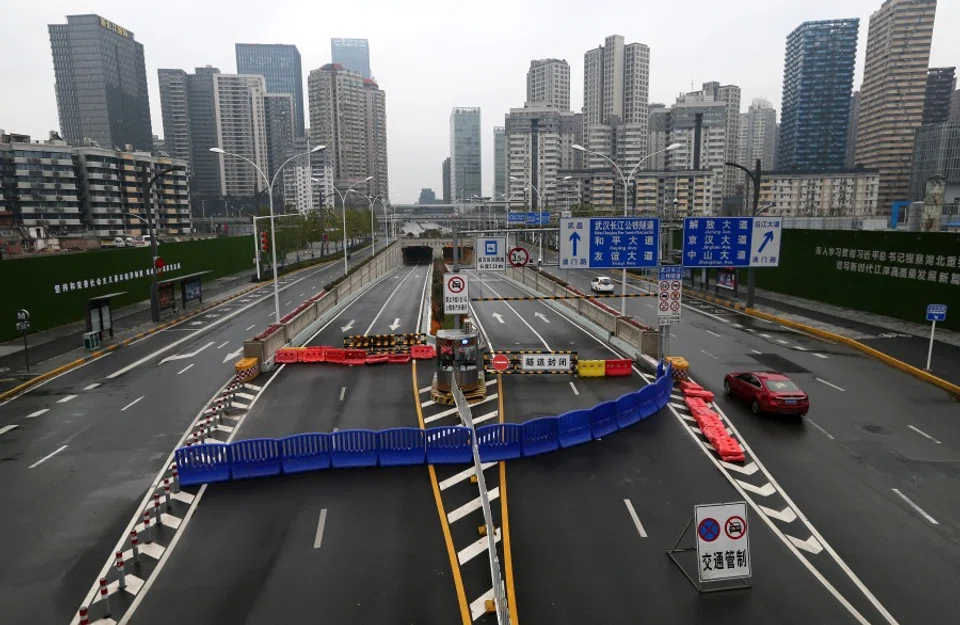Is the lockdown airtight? Infected Wuhan former prisoner's entry into Beijing sparks concern
The case of a former Wuhan prison inmate who tested positive for Covid-19 after travelling to Beijing has sparked debate about loopholes in China's lockdown measures. Coupled with signs that new cases are on the rise again in Beijing, fears are renewed. Lianhe Zaobao's Beijing correspondent Yang Danxu gets to the heart of the matter.

Just as China is getting the epidemic under control, a new risk is emerging, in the form of a huge gap in the defences of tightly guarded Hubei, with new confirmed cases outside of Hubei returning to double digits on 26 February. Academics in China are concerned that the lockdown is not airtight and may lead to wasted efforts against the epidemic.
The residents' committee of Xinyi Homeland in Dongcheng, Beijing reported on 26 February that a person from Wuhan showed signs of fever on the 18th and arrived in Beijing on the 22nd, and was confirmed to have Covid-19 on the 24th. Three of the person's family members were put under observation.
Netizens are questioning how Huang and her family made it through the many roadblocks between Beijing and Wuhan, whether there is a major gap in the Wuhan lockdown, and whether Huang is an isolated case.
China Business Network later revealed that the person involved was a woman surnamed Huang, who was released from Hubei's prison and driven from Wuhan to Beijing by her family in the early hours of the 22nd.
Given the large-scale closure of routes going out of Wuhan and Hubei, this unusual case has drawn attention. Netizens are questioning how Huang and her family made it through the many roadblocks between Beijing and Wuhan, whether there is a major gap in the Wuhan lockdown, and whether Huang is an isolated case.
The fact that Huang stayed in an upscale area in Beijing also sparked speculation about her status and background. The Beijing News reported that Huang, who is in her 60s, worked in the water resources bureau of a district in Hubei before she was sentenced to 10 years' jail in 2011 for corruption. She was released on 17 February after having her sentence reduced twice.

Central government set up joint investigation team
The large loophole found in Hubei's lockdown measures has rocked the central government. On the evening of 26 February, the Ministry of Justice announced that vice minister Liu Zhiqiang will lead a joint investigation team consisting of members from the Central Political and Legal Affairs Commission, Prosecutor General's Office, and the Ministry of Public Security to Hubei.
"no matter who it involves, the matter will be fully investigated" - Hubei party secretary Ying Yong
Hubei and Beijing have also announced setting up investigation teams respectively. On 26 February, Hubei's newly appointed party secretary Ying Yong said in harsh criticism that such serious lapses in control were unacceptable at such crucial period, and "no matter who it involves, the matter will be fully investigated".
The Beijing municipal supervisory committee also set up an investigation team to look into how Huang entered Beijing and the residential area, and to verify if there were gaps in the efforts against the epidemic.
The three places involved - Wuhan, Beijing, and the prison - are all sensitive areas in controlling the epidemic.
While the worst of the epidemic seems over in Wuhan, the situation remains difficult. Since 21 February, China's top leaders have issued three warnings about the epidemic in Beijing, calling on people to do all they can to control the epidemic, and hold the routes into Beijing as the first line of defence.
Furthermore, the recent outbreak in Chinese prisons has exposed a blind spot in epidemic efforts. As of 23 February, there were 323 confirmed cases among current inmates in Hubei's prison system, including 279 cases in Wuhan's female prisons. The Beijing News reported that since February, several inmates have been released and left Wuhan.

Professor Ren Jianming of Beihang University told Zaobao that it would be understandable if Huang's case was one isolated lapse due to fatigue, but if it was a case of the lockdown system being too lax, that would be worrying.
He said, "The scariest thing is if the so-called exceptions are in fact not in the minority. That would seriously jeopardise the epidemic efforts."
... disturbing rebounds are beginning to surface in China's situation.
There have already been cases of misuse of authority and powers over distribution of resources in Hubei, and Prof Ren thinks the authorities should thoroughly investigate whether Huang's case involved power play and bribery, or whether it was a systemic problem.
Even with the gaps in Hubei's epidemic control, disturbing rebounds are beginning to surface in China's situation. Figures from the National Health Commission show that there were 433 reported new cases on 26 February, with new cases outside of Hubei rising back to 24, after two days in single digits.
In Beijing, 10 new cases suddenly emerged on 26 February, showing that efforts cannot be relaxed. These 10 cases are all close contacts of a previous imported case in one cluster, involving a cleaner who went to work despite being infected.
Related readings: Safeguarding Beijing | [Photo story] Shunned everywhere, Hubei people want to go home




![[Photos] Fact versus fiction: The portrayal of WWII anti-Japanese martyrs in Taiwan](https://cassette.sphdigital.com.sg/image/thinkchina/3494f8bd481870f7c65b881fd21a3fd733f573f23232376e39c532a2c7593cbc)
